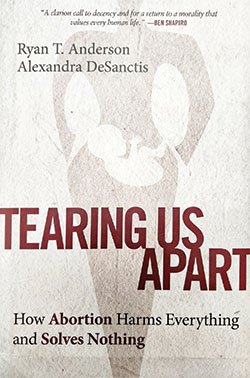Tearing Us Apart can help shape public discussion on protecting unborn babies
By Sean Gallagher
 When the Indiana General Assembly met in a special session in late July and early August last year, it was the first state legislature in the country to take up a bill to give legal protection to unborn children in the wake of the U.S. Supreme Court’s historic June 24, 2022, ruling in Dobbs v. Jackson Women’s Health Organization.
When the Indiana General Assembly met in a special session in late July and early August last year, it was the first state legislature in the country to take up a bill to give legal protection to unborn children in the wake of the U.S. Supreme Court’s historic June 24, 2022, ruling in Dobbs v. Jackson Women’s Health Organization.
That ruling overturned the court’s 1973 Roe v. Wade decision that had struck down all state laws restricting abortion.
The majority in Dobbs ruled that Roe was wrongly decided, that the U.S. Constitution did not include a right to abortion and that states could, therefore, pass laws giving legal protection to unborn children.
Dobbs opened a floodgate of legislative public discussion about abortion that had been restricted in the past since state legislatures under Roe were severely restricted in their consideration of pro-life bills.
As Senate Bill 1 was being considered in the Indiana Statehouse last summer, hundreds of Hoosiers stepped forward to make arguments before their legislators for or against the proposed law—something not possible before Dobbs.
Senate Bill 1 was eventually passed by the Indiana General Assembly and signed into law by Gov. Eric Holcomb. But the discussion about abortion has not ended.
Only days after the new law went into effect in September a special judge in a Monroe County court put an injunction on it while the state’s judicial system examines whether or not it violates Indiana’s constitution.
As The Criterion went to press, the Indiana Supreme Court was scheduled to begin hearings in the case on
Jan. 19 in the same Statehouse where the law was passed last August and while the Indiana General Assembly is now meeting in its regular session.
So, while people who advocate for the legal protection of unborn babies can rightly celebrate the ruling in Dobbs, they need all the more to be able to speak persuasively about why their beliefs are good for society as a whole.
Tearing Us Apart: How Abortion Harms Everything and Solves Nothing (Regnery, 2022), co-authored by Ryan T. Anderson and Alexandra DeSanctis, is a book that can help pro-life advocates do just that.
Written before the issuing of the Dobbs ruling but with that case very much in mind, the book was released shortly after the historic ruling.
In it, the authors explore how abortion has negatively affected all aspects of society: women, families, equality and choice, medicine, law, democracy, media and popular culture—and, of course, unborn children themselves.
Likewise, they also make the case for how giving legal protection for unborn babies and thus restricting abortion can have a positive effect on society, making it more humane in countless ways.
In making these arguments, Anderson and DeSanctis cite numerous sources—from popular media to social science and medical journals. Notably, however, readers will not find citations of Scripture, sermons or religious teaching documents.
This absence is not because the authors find no value in such sources. They’re both committed Catholics. They just want to establish that pro-life convictions are strongly based in the principles of natural law, which anyone can grasp through reason alone and wholly apart from faith.
Given the increasing secularization of society, such an approach to making persuasive pro-life arguments in the public square today is vital.
Many of the pro-life advocates who spoke before legislators at the Statehouse last summer made their case for legally protecting unborn children primarily from the perspective of their faith.
It wasn’t a surprise, therefore, that those who opposed Senate Bill 1 argued that passing it would be an unconstitutional imposition of faith on people who do not affirm it.
The same cannot be said of the arguments offered by Anderson and DeSanctis. Those who advocate for legal abortion might disagree with the authors. But, given their wide citation of many scientific sources, they’ll have a harder time making a coherent case against them.
Most of us won’t have the chance to stand before legislators to share our pro-life convictions. But we do have many opportunities to have conversations about the goodness of protecting unborn babies and helping their mothers with our friends, relatives, neighbors, co-workers and maybe sometimes even complete strangers.
The information shared and persuasively presented in Tearing Us Apart can hopefully help shape these conversations in ways that will move the hearts and minds of people who are either indifferent about abortion or who believe in its legality.
This book can also encourage pro-life advocates because the authors represent a generation of people born well after Roe who are convinced of the importance for all of society to promote the legal protection of unborn babies.
They’re both solidly grounded in the Catholic faith and are graduates of the University of Notre Dame in northern Indiana.
Now that the legal protection of unborn children is a topic for public discussions that can have a real effect in our laws and the way we shape society, it’s good to know that there are such strong voices from young adults like Anderson and DeSanctis, who can hopefully shape the thoughts and opinions about the goodness of life in our society. †
